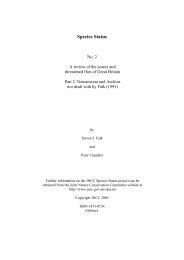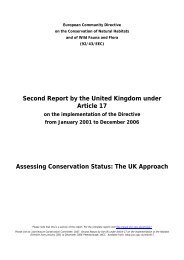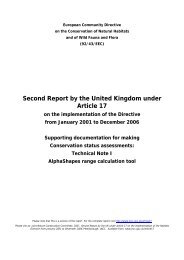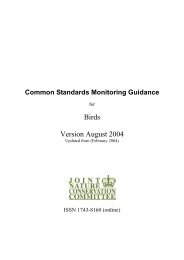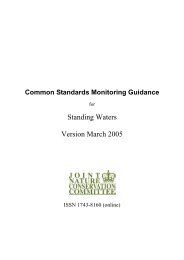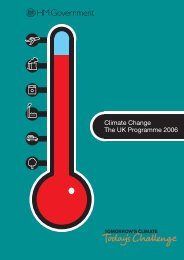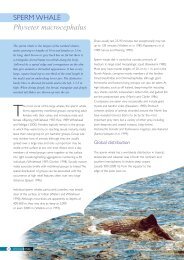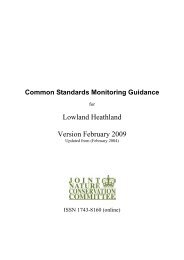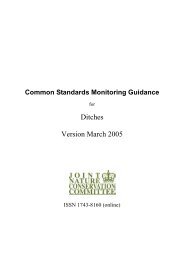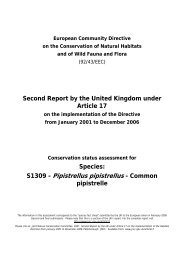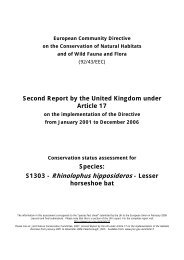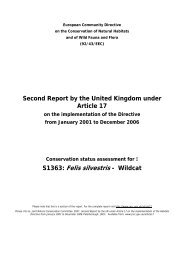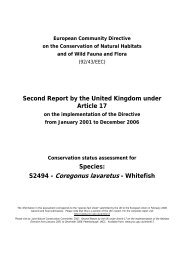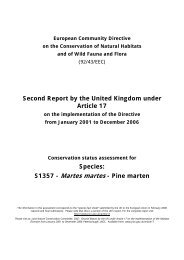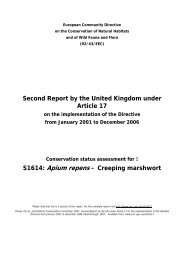Climate change in the UKOTs an overview of the ... - JNCC - Defra
Climate change in the UKOTs an overview of the ... - JNCC - Defra
Climate change in the UKOTs an overview of the ... - JNCC - Defra
You also want an ePaper? Increase the reach of your titles
YUMPU automatically turns print PDFs into web optimized ePapers that Google loves.
oth adapt <strong>an</strong>d mitigate.<br />
“<br />
”<br />
Good climate policy aims to<br />
<strong>the</strong> future, even though <strong>the</strong> costs are<br />
immediate <strong>an</strong>d local. Robust, early mitigation<br />
will reduce <strong>the</strong> cost <strong>of</strong> adaptation over<br />
<strong>the</strong> long term (Stern, 2007). Mitigation<br />
refers to us<strong>in</strong>g policies <strong>an</strong>d o<strong>the</strong>r <strong>in</strong>terventions<br />
to reduce greenhouse gas emissions<br />
<strong>an</strong>d improve <strong>the</strong> function<strong>in</strong>g <strong>of</strong> carbon <strong>an</strong>d<br />
greenhouse gas s<strong>in</strong>ks. While adaptation<br />
deals with ‘wea<strong>the</strong>r<strong>in</strong>g’ current <strong>an</strong>d future<br />
impacts <strong>in</strong> <strong>the</strong> best possible way, <strong>the</strong> idea<br />
beh<strong>in</strong>d mitigation is to go from present<br />
levels <strong>of</strong> climate <strong>ch<strong>an</strong>ge</strong> impacts to<br />
reduced levels <strong>in</strong> <strong>the</strong> future. The <strong>in</strong>ternational<br />
mech<strong>an</strong>ism for do<strong>in</strong>g this is <strong>the</strong><br />
United Nations Framework Convention on<br />
<strong>Climate</strong> Ch<strong>an</strong>ge (UNFCCC). This treaty<br />
<strong>an</strong>d its <strong>in</strong>struments aim to reduce greenhouse<br />
gas emissions, us<strong>in</strong>g 1990 as a<br />
basel<strong>in</strong>e year, <strong>in</strong> order to combat climate<br />
<strong>ch<strong>an</strong>ge</strong> (see Box 10).<br />
“Both…<strong>an</strong>d”, not “ei<strong>the</strong>r…or”<br />
Good climate policy aims to both adapt<br />
<strong>an</strong>d mitigate. Adaptation is crucial<br />
because even <strong>the</strong> most rigorous mitigation<br />
measures taken today will not stave <strong>of</strong>f <strong>the</strong><br />
negative effect <strong>of</strong> <strong>the</strong> warm<strong>in</strong>g already <strong>in</strong><br />
process. Unmitigated climate <strong>ch<strong>an</strong>ge</strong> at<br />
<strong>the</strong> current rate will challenge <strong>the</strong> capacity<br />
<strong>of</strong> m<strong>an</strong> <strong>an</strong>d nature to adapt.<br />
Given <strong>the</strong> small contribution that <strong>UKOTs</strong><br />
make to greenhouse gas emissions <strong>an</strong>d<br />
<strong>the</strong> great extent to which <strong>the</strong>y are affected<br />
by global warm<strong>in</strong>g, <strong>the</strong> thrust towards<br />
adaptation will be greater <strong>in</strong> <strong>UKOTs</strong> th<strong>an</strong><br />
<strong>the</strong> adoption <strong>of</strong> mitigative strategies. Even<br />
so, <strong>the</strong>re is scope for <strong>the</strong>m to promote <strong>an</strong>d<br />
adopt mitigation options that contribute to<br />
<strong>the</strong> global effort, while adv<strong>an</strong>c<strong>in</strong>g <strong>the</strong>ir<br />
national development agendas.<br />
Box 10. The <strong>in</strong>ternational response to climate <strong>ch<strong>an</strong>ge</strong><br />
The United Nations Framework Convention on <strong>Climate</strong> Ch<strong>an</strong>ge (UNFCCC)<br />
(UNFCCC) was adopted <strong>in</strong> 1992 to provide a context for tak<strong>in</strong>g measures to stabilise<br />
<strong>the</strong> concentrations <strong>of</strong> greenhouse gases <strong>in</strong> <strong>the</strong> atmosphere at a level that would<br />
m<strong>in</strong>imise <strong>the</strong> hum<strong>an</strong> contribution to climate <strong>ch<strong>an</strong>ge</strong>. Its first mech<strong>an</strong>ism was to set a<br />
voluntary target for developed countries to reduce greenhouse gas emissions to 1990<br />
levels by 2000. The UNFCC is a non-b<strong>in</strong>d<strong>in</strong>g <strong>in</strong>ternational treaty, but <strong>in</strong>cludes<br />
provisions for obligatory procedures or protocols that commit signatories to action.<br />
The first such agreement, <strong>the</strong> Kyoto Protocol, was adopted <strong>in</strong> 1997. It is l<strong>in</strong>ked to <strong>the</strong><br />
convention but st<strong>an</strong>ds on its own as a legally b<strong>in</strong>d<strong>in</strong>g commitment to reduce<br />
greenhouse gases by 2012 as a percentage <strong>of</strong> 1990 levels. Developed country<br />
signatories have prescribed targets, while develop<strong>in</strong>g countries are encouraged to<br />
<strong>in</strong>troduce emission abatement measures.<br />
Negotiations have begun on <strong>the</strong> agreement that will succeed <strong>the</strong> Kyoto Protocol. A<br />
pl<strong>an</strong> <strong>of</strong> action for reach<strong>in</strong>g a new agreement once <strong>the</strong> Kyoto Protocol expires,<br />
popularly known as <strong>the</strong> Bali Roadmap, has been developed. It sets out a process for<br />
negotiations that must be completed by 2009 <strong>an</strong>d which will result <strong>in</strong> a new set <strong>of</strong><br />
emissions targets. It also provides a framework for talks about adaptation, facilitat<strong>in</strong>g<br />
<strong>the</strong> tr<strong>an</strong>sfer <strong>of</strong> cle<strong>an</strong> technologies to develop<strong>in</strong>g countries <strong>an</strong>d reduc<strong>in</strong>g emissions<br />
from deforestation.<br />
Source: United Nations Framework Convention on <strong>Climate</strong> Ch<strong>an</strong>ge (www.unfccc.<strong>in</strong>t)<br />
61



